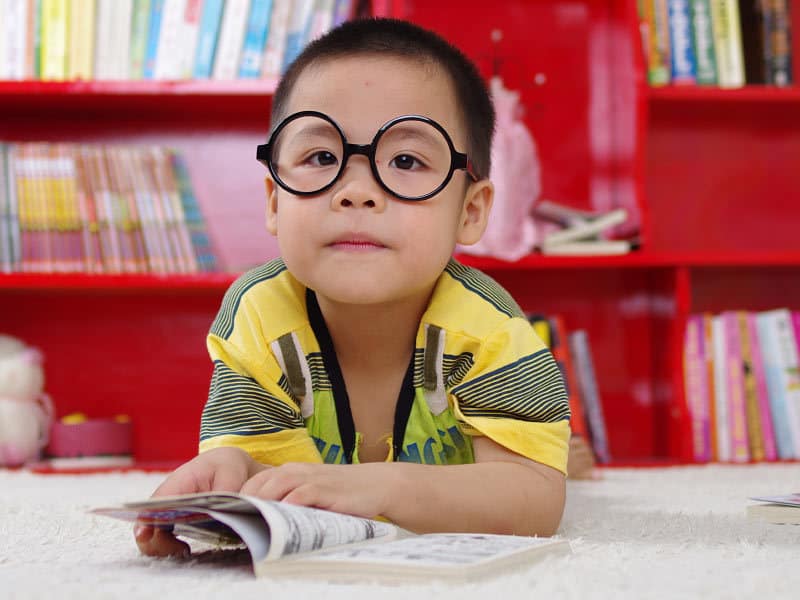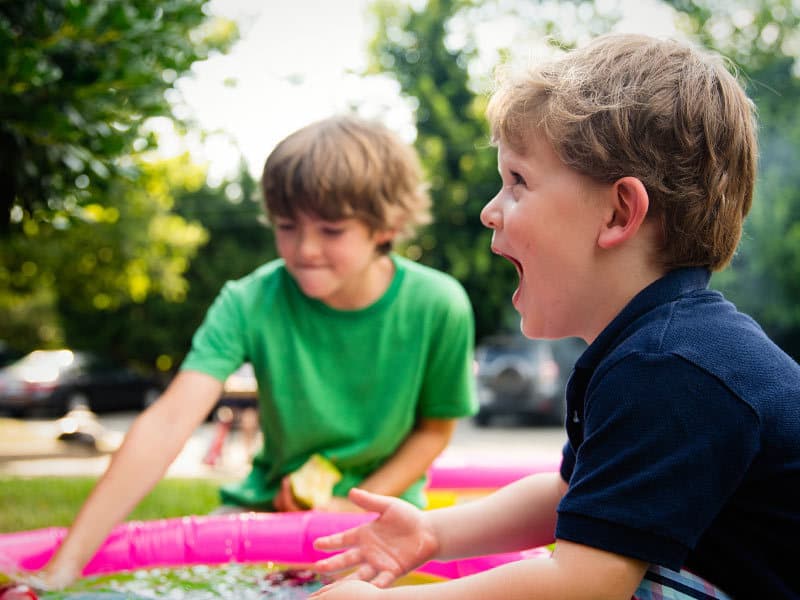Make Way for Play
Having the freedom to play puts your child on the road to learning success — for life.
On a recent stroll through the park, I watched two young boys at play. I could feel their excitement and joy as they chased each other in a spirited competition to see who could scoot up the slide, drop down the fire pole, and kick a soccer ball the farthest. Over and over again they launched their game in breathless squeals of delight. I thought about how perfect this kind of play is for kids to learn a variety of skills and experience pure, safe, unbridled freedom.
The boys reminded me of the same feelings I had running, climbing, and sliding in my younger days. If only we adults could recall that feeling more often, we might better appreciate the importance of free play in the lives of our children and create more time for it. We all know kids love to play. But we also must realize that our kids need to play to grow as people.
Free unstructured play helps children build a wide range of skills necessary for success in school and out, from making friends and negotiating to problem-solving, thinking creatively, and practicing self-control. As a parent, you are in a terrific position to ensure that your child has plenty of time to get out there and play, especially during the more leisurely summer months.
Testing the Waters
Free play, or unstructured playtime, is the most reliable form of self-education and discovery children can have. It gives them a safe context to try out new life skills and ways of being. Through the open exploring and “testing” of play, children become aware that taking action really is what it takes in life to get what you need and want. And with this knowledge, the desire to do something and the courage to do it grow.
Parents who understand the ego needs of their children know that their emotional health is promoted through play. So, they provide suitable play materials, adequate play space, and time for full play. Through these means, your child soaks up knowledge about himself, about others, about life, and about how stuff works in the way kids have for centuries — by having fun. He also gets a large dose of modern-day stress relief by just getting to be a kid.
Unfortunately, over the past few years, the value our society places on play has evaporated like a puddle on a hot playground. There are many reasons for this phenomenon: an increased emphasis by schools on academics; the corresponding elimination of recess and physical education; a greater number of organized activities like sports and lessons; the exploding use of computers and TV in kids’ lives; and parents’ fears that their children will fall behind if they aren’t enrolled in extra programs.
Fortunately, people — educators, specialists, and parents — are becoming more aware of the need to tip the scales back in favor of free play. It’s in this spirit that the American Academy of Pediatrics issued a report reassuring us that unstructured playtime is one of the healthiest things for our children: “The challenge for society, schools, and parents is to strike the balance that allows all children to reach their potential, without pushing them beyond their personal comfort limits and while allowing them personal free time.”
What Kids Can Learn
The advantages your child gains from play may seem a mystery when he’s dashing like a madman through the park sprinklers, but he’s growing by leaps and bounds:
Character virtues. Children develop a unique sense of self-worth from being creative. While finishing a tower of blocks, for example, your child may encounter a moment when the tower refuses to stand. It may even topple a few times. By trying again and again, he learns about perseverance and gains a dash of courage and confidence in his own problem-solving abilities.
Social skills. Research shows that make-believe games provide kids with opportunities to learn about group dynamics. Give a pair of 4-year old’s a large empty appliance box, for instance, and they’ll turn it into a truck or a castle, and in the process, hone their ability to collaborate, cooperate, empathize, and control impulses.
Physical development. You watched your baby learn how to crawl, to stand, and eventually to walk. Now, watch your preschooler figure out how to hang from the first rung on the monkey bars (with perhaps a boost from you), and then work his way on his own to the second rung and the third, and so on, as he also builds up his strength, coordination, competence, and sense of body awareness in space.
Self-discovery. Kids need time to be kids — to write, think, dream, draw, build, dance, fantasize. That’s how they discover their likes and dislikes. Be sure to allow your child his kid time.
Fitting in Fun
Carving out time from your busy schedule to give your child more opportunities for free play may not be easy. But it’s not impossible, and it’s desirable, when you consider that not only does it benefit him, but it also gives you the chance to step out of the manager’s role in your child’s playtime. What a relief! You may also want to consider cutting out an organized activity from your family’s week to make more room for free play. And if you can take the perspective that by easing up, you’re modeling the type of behavior you’d like to see from your child, you’re on the right track. Here are some ways to put more of the fun kind of learning into your child’s life:
Value the park. Try to make time every day, if possible, to take your child to a playground or a public park. Allow him to simply enjoy the jungle gym or kick a ball with no expectations. The physical activity will not only give him a chance to feel free (and work those muscles), but it will also help tucker him out for naptime or bedtime.
Get into the backyard. Going outdoors more, anywhere from the backyard to the backwoods, will give your child a chance to use his investigative powers to explore his surroundings. Let invention take over as he picks up sticks, digs in the mud to look for worms, or simply throws rocks into the water to watch the ripples.
Keep those playdates. Kids learn how to socialize from direct interaction or from simply watching other kids. Make sure your child has opportunities to get together with friends. The cooperative play that results can take place anywhere, at your home or in the park. You will, of course, want to be available to help settle disputes that the kids can’t resolve themselves, or to distract tired tots who lose control. (But you’ll also grab some free time for yourself when your child is enjoying a playdate at a friend’s home.)
Foster creativity. Kids have a built-in need to express themselves. It’s how they make meaning of the world, whether it’s through song, movement, music, painting, story, or poetry. Keep these materials on hand:
- Dress-up costumes and props. During make-believe, kids can try on adult personas and experiment with solving “real-life situations.” Do you have a couple of yards of fabric, some odd hats, or an old briefcase buried in the back of a closet you can spare?
- Paper-towel rolls, plastic bottle caps, and scraps, blocks, sand, mud, and water. Allow your child to make whatever he wants from these items and hold no expectations. Without pressure to produce a recognizable finished product, your child will feel capable of dealing with openness and ambiguity.
It’s easy to use science to justify why our kids need more playtime. After all, studies show that children who have freedom of creative expression grow up to be thoughtful, tolerant adults who think well on their feet. That makes for a winning resume. But the bottom line is: kids deserve playtime. It’s their birthright. Play is what they do; it’s what makes them happiest.





